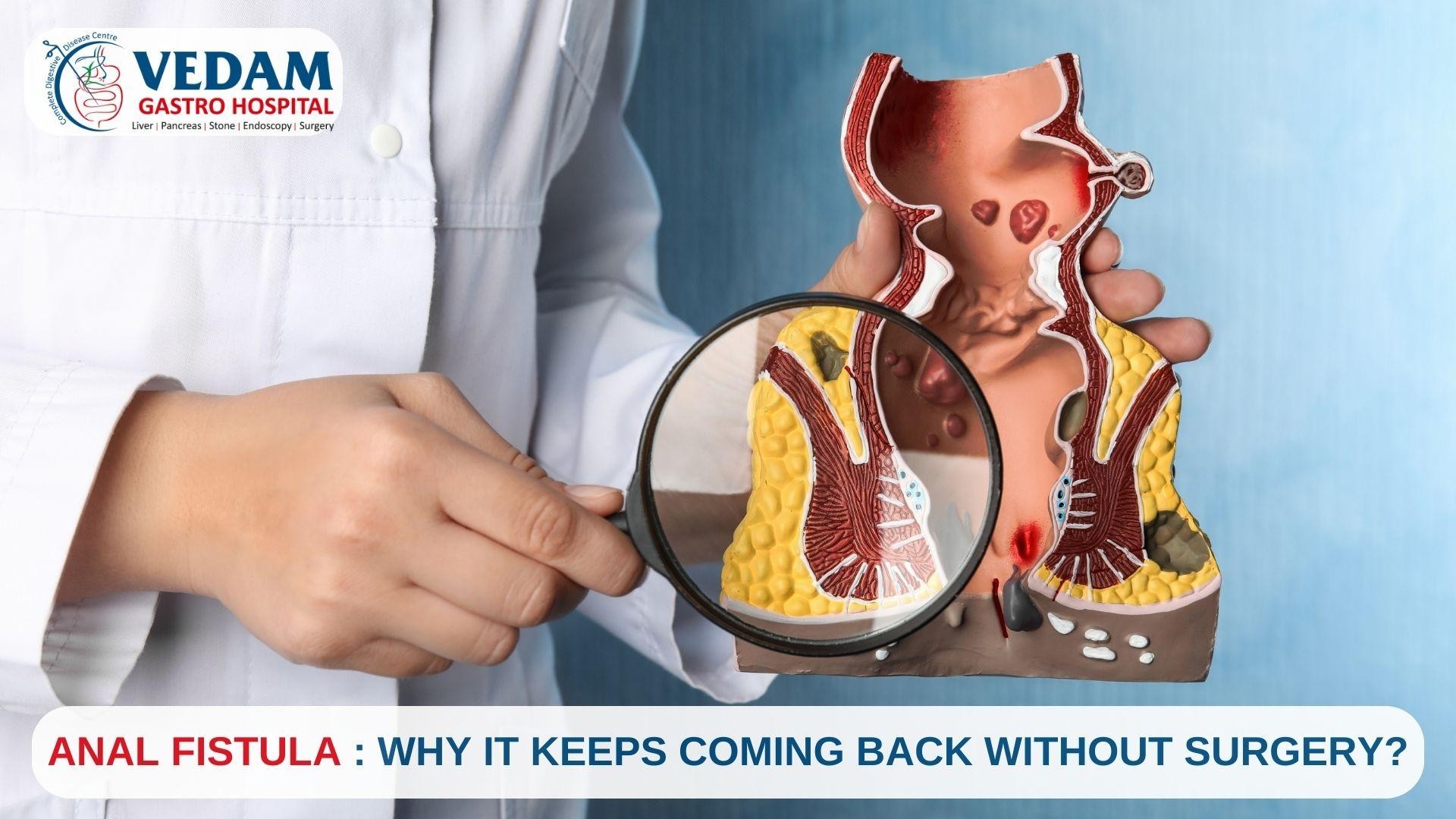
Anal fistulas are persistent and painful. The discomfort, swelling, and recurring discharge can interfere with your daily life, and often, even after multiple rounds of treatment, the fistula returns. To understand why they happen and why they won’t go away, we spoke to our experts, one of the best colorectal surgeons in Surat at Vedam Gastro Hospital.
What Is an Anal Fistula?
An anal fistula is a small tunnel that forms between the end of the bowel and the skin near the anus. It often develops after an abscess (a pocket of pus) drains or bursts. While the abscess might heal on the outside, the internal opening remains — and that’s where the problem begins.
This tunnel can repeatedly fill with fluid or infection, leading to recurring abscesses, pain, and drainage. Over time, it becomes a chronic issue that doesn’t resolve on its own.
Why Non-Surgical Treatment Often Fails
Many people hesitate to go in for surgery, hoping that medication, home remedies, or lifestyle changes might help. While some of these methods can temporarily reduce symptoms, they rarely address the root cause.
Here’s why the fistula keeps coming back:
1. The Internal Opening Doesn’t Close
The primary reason an anal fistula recurs is because the internal opening — the original source of infection — remains open. Until that passage is closed and the tract is properly removed or drained, the problem won’t go away permanently.
Antibiotics can help with infections, and sitz baths may relieve pain, but neither can seal that internal hole.
2. Infection Keeps Brewing
The fistula tract is like a secret path for bacteria. Even if you feel better for a few days or weeks, bacteria can travel through the tunnel, causing fresh infections and abscesses. You might find yourself going through the same cycle again and again.
Unfortunately, unless the tract is surgically cleaned and closed, infection will keep finding its way back.
3. Scar Tissue Isn’t Healing Properly
Each time the fistula flares up, your body responds by trying to heal the area. But repeated infections lead to scar tissue that doesn’t function like healthy skin or muscle. This can block drainage and create pockets where pus collects — leading to even more abscesses.
Surgical treatment by a skilled colorectal surgeon in Surat can ensure that scarred or damaged tissue is properly removed, allowing real healing to begin.
Why Surgery Is Often the Only Solution
Surgery might sound intimidating, but it’s often the most reliable and permanent way to deal with a chronic anal fistula. Depending on the complexity of the fistula, procedures like fistulotomy, seton placement, or advancement flaps may be recommended.
Each surgical method aims to do two things:
● Remove or close the fistula tract
● Preserve control of bowel movements (especially when the fistula is near the anal muscles)
Without surgery, there’s no way to guarantee that the internal opening will close fully, or that the infected tissue will be removed. That’s why fistulas tend to keep coming back when treated non-surgically.
Choosing the Right Doctor Matters
Treating an anal fistula isn’t just about any surgery, it’s about precise surgical planning and expertise. Complex fistulas can involve multiple branches, deep tracts, or connections to other structures. That’s why you should look for someone experienced in dealing with colorectal conditions.
If you’re searching for the best colorectal surgeon in Surat, make sure to choose someone who has a track record of handling both simple and complex fistula cases with success.
What Recovery Looks Like
Post-surgery, most patients recover within a few weeks. You may be advised to take sitz baths, follow a high-fiber diet, and avoid straining during bowel movements.
While no surgery is without risk, most patients report significant relief after a successful procedure — especially when compared to the frustration of repeated infections and abscesses.
Ignoring It Can Lead to Complications
Some people choose to live with the symptoms, assuming it’s just a recurring pimple or minor issue. But untreated fistulas can lead to:
● Repeated abscess formation
● Skin damage around the anus
● Infection spreading to other areas
● Fistula enlargement or branching
If your symptoms have been recurring for more than a few weeks, it’s time to consult a specialist. A visit to a specialised Stomach Hospital in Surat can help you understand whether you’re dealing with a fistula or another condition like a fissure or hemorrhoids.
Take the First Step
Living with a fistula doesn’t have to be your new normal. If home remedies haven’t worked, and you’re tired of the pain and repetition, don’t delay a proper evaluation.
Some of the Best Gastro Hospitals in Surat, like Vedam Gastro Hospital, offer advanced diagnostic tools and minimally invasive options that can resolve the issue once and for all.
